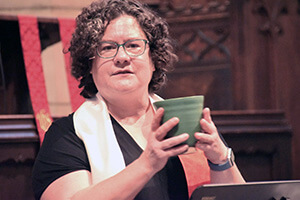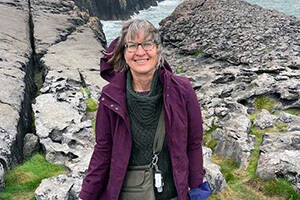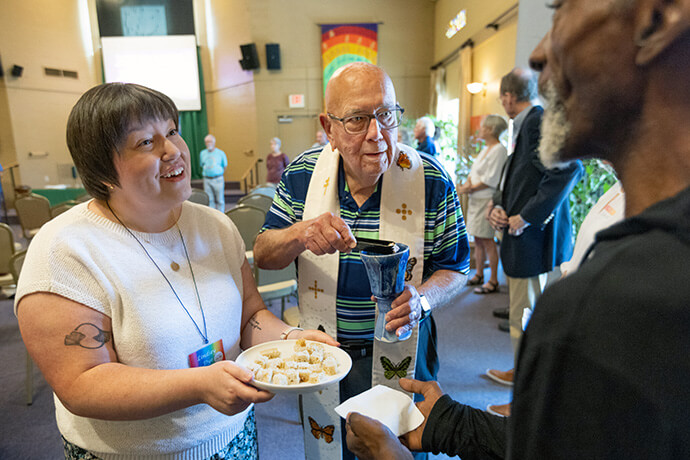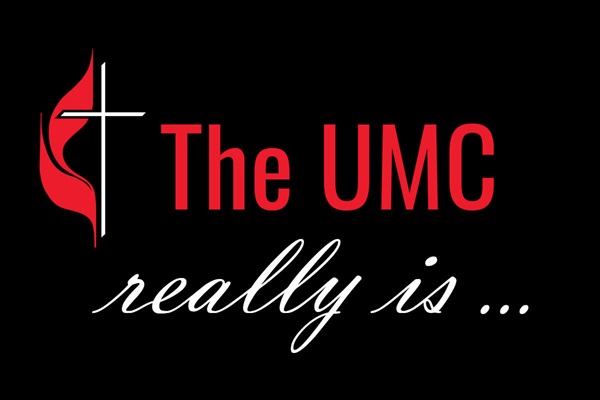This is Part 3 of a seven-part series. You may find all articles in the series, as they are published, on the series landing page.
United Methodists had been terminating clergy because of their gender or sexual identity or because they had presided at a same-sex union or marriage ceremony long before there was specific language in the Book of Discipline naming these matters as unauthorized conduct or chargeable offenses.
Because both the candidacy process and the complaint process are generally confidential, there is no known total of the number of United Methodist clergy who were for such reasons either discontinued during their candidacy, pressured out of their clergy role, granted an “early retirement” or required to surrender their credentials through a formal complaint process.
The 2024 General Conference took action to begin to offer a means of redress for those whose clergy careers in The United Methodist Church were ended for such reasons.
Text on labels for stoles at the 2000 General Conference by L. Deen Thompson
Men and women dress up and speak aloud.
They speak in your name, O Lord,
and say all evil against us.
Did you not know us in our mother's womb?
Did you not walk with us through the waters of baptism?
Did you not call us by name?
Turn not away from us.
Hold us by your hand.
And walk with us until your kingdom rules in the hearts of all your creation.
Deen 3-28-2000
Source
This happened in three steps:
First, on May 1, Petition 20928 was approved on a vote of 606-91, amending Paragraph 367. That paragraph had provided a means of reinstatement for clergy terminated for any reason, but only if such termination had occurred prior to the 1976 General Conference. That time limit for reversing terminations was deleted.
Then, on May 2, a motion to reconsider that decision was approved (438-268).
Finally, on May 3, a substitute motion was approved (474-178), laying out a specific and time-limited process for reinstating “[p]ersons who have been terminated, surrendered, or have had their membership and license for ministry revoked by an annual conference or one of its legal predecessors due to their sexual orientation, gender identity, or for celebrating a same gender wedding or union.” This process would take effect immediately upon the close of the 2024 General Conference.
Under the terms of this newly adopted process, the persons affected by these previous actions have until May 15, 2025 to file an official request to have their full membership, provisional membership or license for ministry reinstated and their certificates of ordination or consecration (if surrendered) returned to them by the annual conference.
Approval of this request requires a 2/3 vote of the conference board of ordained ministry and ratification by a subsequent 2/3 vote of the clergy session of the annual conference. When those votes are completed in the affirmative, reinstatement is immediate. Clergy reinstated under these provisions become eligible for appointment as appointments are available, and all relevant certificates are also restored to them at that time.
If, however, either the board of ordained ministry or the clergy session does not approve the reinstatement, the person or their bishop may request review by another annual conference. This situation creates an extension of the time to submit the request until November 2025.
During the course of the 2024 annual conference season in the United States, Ask The UMC is aware, to date, of three clergy (two women and one man) who have been reinstated as elders in full connection. They are Irene Elizabeth “Beth” Stroud (Eastern Pennsylvania), Susan Morgan (Desert Southwest), and Leonard Deen Thompson (Louisiana). Of these, only Stroud will be appointed to active ministry, and she will be in an extension ministry setting. The Revs. Morgan and Thompson are retired.

Beth Stroud had served as associate pastor at West Chester United Methodist Church and First United Methodist Church of Germantown in Philadelphia, both in the Eastern Pennsylvania Conference, prior to a church trial in 2004 in which Stroud was found guilty of being a “self-avowed practicing homosexual.” She was required to surrender her clergy credentials. After leaving a lay ministry staff role at First United Methodist Church of Germantown, she completed a doctorate at Princeton University in 2014 (Ph.D., Religion in America). She had continued in academic roles at Princeton, Union Theological Seminary (New York City) and Sarah Lawrence College. She is now appointed to the faculty of Methodist Theological School in Ohio (Columbus), where she will teach in the area of the history of religion, beginning this fall. She preached and served Holy Communion as an elder for the first time in 20 years on June 16 at First United Methodist Church of Germantown.

Susan Morgan was ordained as an elder in 1994 in the former Nebraska Conference. In 1998 she began serving in the Desert Southwest Conference, officially transferring her conference membership in 1999. She had served as associate pastor at St Francis in the Foothills UMC in Tucson from 1998-2003, then returned from a sabbatical leave to serve under appointment as spiritual counselor/chaplain at Casa de la Luz Hospice in Tucson. It was while she was appointed there, in 2006, that she was placed on voluntary leave (February 27, 2006), and subsequently withdrew from ordained ministry, effective January 1, 2007. She is married to The Rev. Mary Klaehn, who was a clergy delegate to the 2024 General Conference from the Desert Southwest Conference. On June 13, 2024, the clergy session approved her reinstatement, and she was presented with her membership credentials and a stole. She entered the conference as an observer. She left it as a retired clergy member of the conference.

Leonard Deen Thompson, 86, was required by the Louisiana Conference to withdraw from ministerial service and surrender his clergy credentials in 1985 because he was gay. He had been ordained as deacon in the former Methodist Church in 1962 and as elder in 1965. He was still serving as the pastor of First United Methodist Church in Kenner, Louisiana, at the time of his withdrawal. He would go on to serve for sixteen years at Upper Room Ministries/General Board of Discipleship. He has lived in Nashville, Tennessee, where he became an active member of Edgehill United Methodist Church (currently its lay leader) and involved in multiple roles in the Tennessee Conference (lay member from Edgehill, conference board of church and society, conference board of ordained ministries) and an advocate for LGBTQ people in The United Methodist Church and beyond. For the 2000 General Conference, he contributed a poem that was attached to stoles given to LGBTQ delegates and allies in the balcony who stood in silent protest at the failure of that General Conference to remove the ban on homosexual clergy. (See sidebar above). He was also a reserve delegate to the Southeastern Jurisdiction and the General Conference (2016, 2024). He has been married to his partner since 2007 (marriage performed in Canada). At the clergy session on June 11, 2024, he was restored to full connection in the Louisiana Conference and will continue in the retired relationship.
Whether more former United Methodist clergy or clergy candidates who were terminated or otherwise left the ministry of The United Methodist Church will apply for reinstatement, and whether any of these will serve in United Methodist congregations as they formerly had, remains to be seen. The three restored this year are witness to the discriminatory policies and practices of the denomination in the past, their own resilience of spirit in the face of exclusion, and the path to restoration of relationship the 2024 General Conference has opened for a limited time.
Burton Edwards is director of Ask The UMC, the information service of United Methodist Communications.





